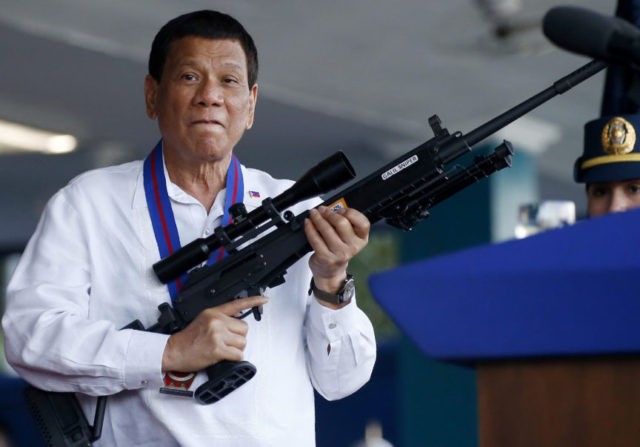Philippines President Rodrigo Duterte told soldiers at an event Thursday the United States is offering military gear for sale, which he is considering buying, but fears Washington would break its commitment to delivery.
Duterte’s remarks come on the same day that his presidential spokesman, Harry Roque, told reporters Manila is “concerned” about revelations in a Pentagon report that China is considering installing nuclear assets in Philippine territory in the South China Sea. Beijing claims most of the South China Sea, including the territory of five other countries, and has developed sophisticated nuclear bases on artificial islands in Philippine and Vietnamese waters illegally.
Speaking in his hometown, Davao City, Duterte reportedly read soldiers a letter he received signed by three American cabinet members – Secretary of Commerce Wilbur Ross, Secretary of Defense James Mattis, and Secretary of State Mike Pompeo – urging him to restore the close ties between the Philippines and America. According to Philippine news agency ABS-CBN, which transcribed Duterte’s reading of the letter aloud, the officials offered America’s “strongest support” to the Philippine military.
“The US-Philippines alliance is an enduring partnership, built on shared history and values. This special relationship will only grow stronger by increasing our dialogue especially on security cooperation and trade,” the letter reportedly said, suggesting that Duterte agreeing to buy American weapons and equipment would “exemplify our continuing commitment to the breadth and the strength of our alliance.”
“Now they want to make it up to me,” Duterte said of the letter. “Three cabinet members in one letter. I don’t know, but maybe it’s because I distanced myself from them.”
Duterte has repeatedly stated that he would like to cut ties with the United States and bring his nation into the orbit of China and Russia. In November 2016, he declared that he would like the Philippines to be part of a “new world order” without America. He has largely failed in this aim, however, because there is no popular will in the Philippines to switch allegiances, and polls repeatedly show growing distrust in China among Philippine respondents.
Duterte hinted that he was interested in a purchase of American weapons, but did not trust Washington after an agreed-upon sale fell through over concerns that drug violence in the country led to government-orchestrated human rights violations.
“How sure are you that I will get what I ordered? If I bought a dozen M16 [rifles], will they deliver them?” Duterte asked, expressing interest in meeting the cabinet members but insisting, “there will never be a time that I will go to America.”
Duterte has attempted to refocus the Philippines military equipment market to China. Last month, Manila received a donation of four small military boats and 30 rocket-propelled grenades (RPGs) from Beijing, allegedly to be used by the Philippine navy to patrol the South China Sea. Yet China has not committed to offering any high-grade materials, nor does it have the ability to mass produce many of the items America can provide.
Manila’s Malacanang Palace also expressed concerns Thursday that China’s colonization of Philippine territory would present a constitutional crisis for the nation if Beijing chooses to install nuclear assets there. The nation’s constitution prohibits the development of nuclear power.
According to the Pentagon report, China has plans to “power islands and reefs in the typhoon-prone South China Sea with floating nuclear power stations.” The Global Times, a Chinese government propaganda outlet, admitted that nuclear technology is part of the South China Sea plan last year.
“We are concerned about the possibility that any foreign power be it American, Russian, Chinese may bring nuclear warheads into our territory and into Asean, which is declared as a nuclear-free zone,” spokesman Harry Roque told reporters, in response to a recent Pentagon report suggesting that nuclear assets could be part of the Chinese military development of the South China Sea.
“The important point to underscore is we have a nuclear-free policy and that should be applied to all countries, including the Americans, because the Americans have been using nuclear-powered [weapons] and have been stationing warships with nuclear capability as well,” Roque added.
Roque also faced questions regarding Duterte’s attitude towards China, as some reporters have noted that Duterte appeared to change his tone to harshly warn China this month.
“If you monopolize [the oil], there will be trouble,” Duterte said at a public event on Tuesday. “That’s where we’re going to have differences. That’s where you’ll see [Interior Secretary Eduardo] Año bring a machete there and cut down the Chinese.”
Last week, Duterte said he hoped China “will temper its behavior. I don’t want to quarrel with China.” He added a warning that, if China did not stop its belligerent behavior towards the Philippines, “one of these days a hothead commander there will just press a trigger.”
The Chinese Foreign Ministry reacted in furor, urging the Philippines to “meet China halfway, and jointly protect the present good situation that has not come easily in the South China Sea” and insisting that the Spratly Islands, which jointly belong to the Philippines and Vietnam.
On Thursday, Roque insisted that his boss has “never been changing tune” on China. “He has been consistent. It’s just that there’s no point in openly picking up a fight with China because it is counterproductive.”

COMMENTS
Please let us know if you're having issues with commenting.